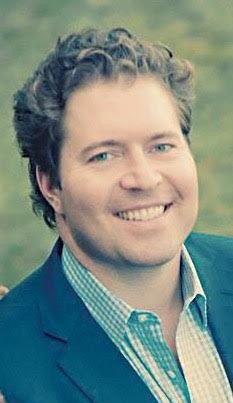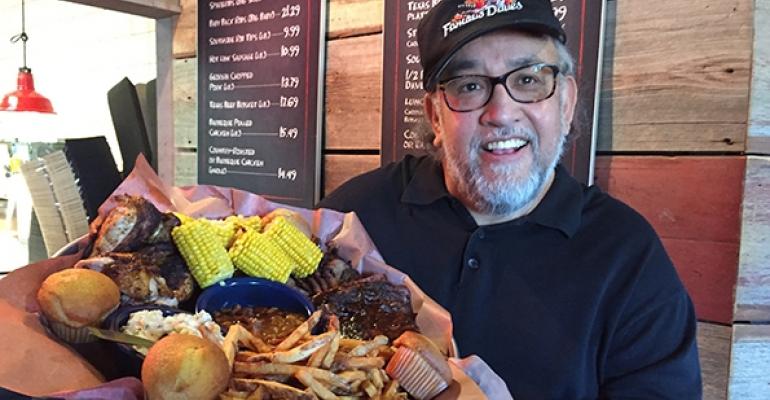On a recent Friday afternoon, Dave Anderson sat behind a table just inside the entrance of a suburban Minneapolis location of the restaurant chain he founded in 1994, Famous Dave’s. He signed autographs and posed for pictures with customers who consider him barbecue royalty.
“I’m glad you’re back,” one customer said. “This place wasn’t the same without you.”
It was a refrain repeated more than a few times during the autograph session, where Anderson signed copies of his barbecue cookbook as family members and friends of the chain tried some of the concept’s newly created recipes.
Over the past six months, Minneapolis-based Famous Dave’s of America Inc. has made numerous changes under newly appointed CEO Adam Wright. It added a chief operating officer in Abe Ruiz. It added a franchisee to its board of directors in Anand Gala. And, more recently, it named a new chief marketing officer in former Caribou Coffee executive Alfredo Martel.

But perhaps the biggest change was bringing back Anderson, the chain’s amiable founder, who left Famous Dave’s in 2014 amid differences with management. Wright wants to bring Famous Dave’s back to where it started, and he wants Anderson to be the guide.
“We’re getting back to our roots, serving the highest quality food and focusing on guest hospitality,” Wright told Nation’s Restaurant News. “We’ve returned to what Famous Dave’s did before [former CEO Ed Rensi] did a lot of changes to the brand and to the guest experience.”
The task will not be easy. Famous Dave’s was struggling in 2012 and 2013 when it attracted several activist investors — including Wright — who believed the chain was mismanaged and, as a result, undervalued. The chain named Rensi, a former McDonald’s Corp. executive, as CEO in 2014, and the stock, buoyed by short-term hedge fund interest, more than tripled, to more than $32 per share at one point.
The company’s sales plunged, the stock plunged with it, and last year Rensi resigned, replaced by Wright, who as a teenager and friend of Anderson’s son was a frequent customer at the chain’s first location in Hayward, Wis., when it was called “Diamond Dave’s.”
Same-store sales at company-owned restaurants in the fourth quarter ended Jan. 3 decreased 10.6 percent, on top of a 4.8-percent decrease the prior year. Company-store sales fell 9.3 percent for the full year, according to the chain’s latest earnings release. Famous Dave’s fell out of compliance with requirements in its lending agreement, and its stock currently trades at just about $6 per share.
Along the way, the 179-unit chain largely lost its status as the country’s biggest barbecue concept.
To Wright, and to Anderson, Famous Dave’s lost its way, taking too many shortcuts, building restaurants that were too large and too chain-like, and that cost too much to build.
“I think the company got off track, sort of lost its roots,” Anderson said. “The key for me is bringing back the passion of what barbecue is all about. There are no shortcuts to making great barbecue.”
Anderson is a Choctaw and Ojibwe American Indian who was assistant secretary of Indian affairs in the Department of the Interior under George W. Bush and who has a master's degree in Public Administration from Harvard University, according to a DOI press release.
He grew up on barbecue. Anderson said his father was a fan of Southern cooking, traveling routinely to the South to expose Anderson’s mother to Southern cooking and frequenting barbecue joints in Chicago.
“I almost remember the first bite of smoky barbecue I ever tasted,” Anderson said. “Even then I knew I was going to make it.”
He opened a barbecue shack in 1994, initially called Diamond Dave’s, in Hayward, Wis., after spending 20 years working on recipes. “I probably made 1 million pounds of bad barbecue sauce that ended up going down the kitchen drain,” he admitted. The chain quickly expanded into Minneapolis, and, renamed Famous Dave’s, it went public in 1996.
“Famous Dave’s never did start out to be a corporate, concocted chain,” Anderson said. “We were the real deal starting out.”
But, he said, the chain made changes to satisfy Wall Street. “One of the mistakes I made early on was to listen to attorneys who said I needed to hire casual-dining executives that were Wall Street savvy,” Anderson said. “I should have stuck to my guns and built a team of people who just loved being in the barbecue business.”
Anderson and Wright said that over the years, the chain built restaurants that were too big and too cookie-cutter for a concept that specializes in barbecue. Early restaurants were not big and cost less to build. Even today, they still work well and earn nice profits.
But they also lured long lines of customers, and so the chain built larger restaurants. To fill those larger restaurants, Anderson said, the company expanded the menu. The economics “got sketchy,” he said, as it carried more inventory.
“We should have stayed small,” Anderson said. “People don’t mind waiting for good barbecue.”
Wright agreed. “We started building boxes of restaurants that cost too much to build. They had misaligned economics.” He suggested that the chain would work on lowering that cost to make it easier for operators to generate a return on new units and encourage them to open more.
That’s one of the reasons the company named Gala to its board of directors, making Famous Dave’s a rare public company with a franchisee on its board. Despite all of Famous Dave’s issues, Gala has added locations. “We have to look at why franchisees like Anand continue to open restaurants,” Wright said. “We have to have an open dialogue with franchisees and be collaborative. We have to be in the business to make them more successful and profitable.”
Changing the culture
Wright and Anderson also argue that the chain’s character took a hit in recent years as Famous Dave’s worked to ease operations and lower costs. The company has been critical of moves previous management made, such as getting rid of the chain’s popular cornbread muffins.
There were some unusual moves. Rensi required unit managers to wear suits, which is more fitting for an upscale chain than a barbecue concept, where barbecue stains and the smell of smoke is common.
Under Wright, the company has taken on a more casual atmosphere. In an interview, the CEO himself wore an un-tucked plaid shirt and jeans, and sported a beard that he grew after he was named interim CEO last summer.
Anderson, in his new role at Famous Dave’s, will focus on training to help the chain improve service. “I’m a firm believer that if we take care of our guests, treat them with hospitality deserving of a barbecue joint, feed them the best barbecue we can feed them, then Wall Street will take care of itself,” he said.
He is also working on the recipes and ensuring that the chain is sourcing the right ingredients. Anderson wouldn’t divulge any details. “We have some exciting new sandwich entrée opportunities we’re working on, and some new barbecue sauces,” he said.
He has a firm backer in Wright, who said that the chain would work on hospitality, food and the assets. “We have to re-establish our culture of food and hospitality,” Wright said. The next step, he added, is to remind customers how good Famous Dave’s food is.
Famous Dave’s also has more franchising on its mind. The company recently refranchised its Chicago market, and Wright said the company plans to refranchise other markets as it finds the right operators and improves the value of those restaurants.
Wright said the company is additionally planning a remodeling strategy. Previously, the chain would remodel some of its poorest performing sites first, he said, including locations in Richmond, Va., in 2012, all of which are now closed. Famous Dave’s will instead invest first in the best locations. “We will be more thoughtful and strategic,” he said.
Famous Dave’s is making some headway in its comeback efforts, Wright said. The company’s customer satisfaction scores, considered a key, early metric in a chain’s ability to maintain and grow sales, have increased by double digits in recent months.
But he also acknowledges that a turnaround will take time. And barbecue is not easy. The food takes a long time to smoke, and ensuring that dishes like beef brisket are consistent can be a major challenge.
Yet Anderson noted that there is plenty of room for the chain to grow, and he said that demand for barbecue is intense.
“The world of barbecue is literally exploding,” Anderson said. He rattled off a list of barbecue festivals around the U.S., and even in Europe, some of which count attendees in the hundreds of people.
“It’s an exploding category. There’s a primal, instinctual need for man to eat smoky, charred meat off the bone. There’s something about eating smoky, charred meat that brings out your inner caveman.”
Update: Feb. 24, 2016 This story has been updated with more information including Famous Dave's fourth quarter earnings results.
Contact Jonathan Maze at [email protected]
Follow him on Twitter: @jonathanmaze




